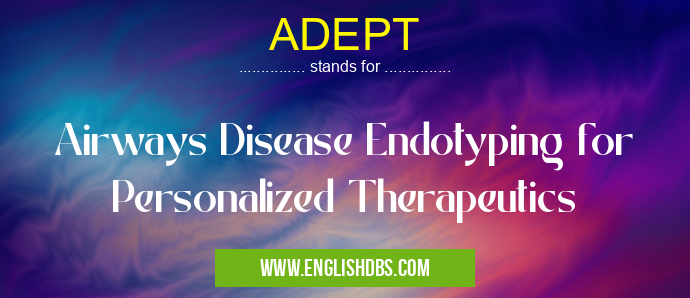What does ADEPT mean in HEALTHCARE
Airways Disease Endotyping for Personalized Therapeutics (ADEPT) is a groundbreaking medical research effort that seeks to identify and classify different endotypes of chronic obstructive pulmonary disease (COPD). These endotypes may help predict which treatments are most effective in treating each patient, leading to personalized treatment plans that can improve outcomes. ADEPT aims to revolutionize the way COPD is treated by providing personalized and more effective therapy options for patients with this condition.

ADEPT meaning in Healthcare in Medical
ADEPT mostly used in an acronym Healthcare in Category Medical that means Airways Disease Endotyping for Personalized Therapeutics
Shorthand: ADEPT,
Full Form: Airways Disease Endotyping for Personalized Therapeutics
For more information of "Airways Disease Endotyping for Personalized Therapeutics", see the section below.
» Medical » Healthcare
Benefits of ADEPT
By identifying distinct types of COPD, ADEPT promises a variety of potential benefits, both at the individual level and at the population level. On an individual level, it can help clinicians personalize care plans for their patients by selecting treatments that are tailored to a specific type of COPD. At the population level, understanding the different types opens up new avenues for public health initiatives aimed at prevention or early detection. The knowledge gained from these efforts could also be used as a foundation for research into novel treatments or potential cures. Ultimately, ADEPT promises better outcomes for patients with COPD across all stages of the disease.
Essential Questions and Answers on Airways Disease Endotyping for Personalized Therapeutics in "MEDICAL»HEALTHCARE"
What is ADEPT?
ADEPT stands for Airways Disease Endotyping for Personalized Therapeutics. It is a revolutionary approach to treating airways disease that emphasizes tailoring treatment plans to the specific individual and their unique characteristics. By using data from genetic testing, clinical symptoms, environmental factors and patient preferences, we can create a comprehensive plan that focuses on targeting the root cause of the disease.
How does ADEPT work?
ADEPT uses a personalized approach to identify the underlying cause of any airways disease, and then develops a tailored treatment regimen to address that cause. We use data from genetic testing, clinical symptoms, environmental factors and patient preferences to create an individualized care strategy that best meets the needs of each person.
Why choose ADEPT over traditional treatments?
Traditional treatments often focus on suppressing symptoms without addressing the underlying causes of airways disease. ADEPT is designed to go beyond symptom management by utilizing more holistic techniques to find out what is causing the issue in order to develop a personalized plan that addresses it at its source. This ultimately leads to greater long-term health outcomes and better quality of life.
What kind of data do you use for ADEPT?
To personalize treatment with ADEPT, we utilize several different sources of data, including genetic testing results, clinical symptoms, environmental factors such as allergens or pollutants in your area, lifestyle habits such as smoking or stress levels, and patient preference information like how you respond to certain types of medications or therapies.
Who should consider using ADEPT?
Anyone who suffers from an airways disease can potentially benefit from using the personalized approach offered by ADEPT. Whether you have asthma or allergies or another disorder affecting your respiratory system, taking advantage of this technology can help you identify and target underlying causes quickly and effectively so you can get better faster.
Is there any risk involved with using ADEPT?
No, there is no risk associated with utilizing this service as long as all necessary precautions are taken when collecting information about your health history and current condition. The data we use is kept confidential in order to maintain privacy throughout the process while still helping us find more accurate solutions tailored specifically for you.
How long does it take for my personalized treatment plan to be created?
The time frame for creating your individualized plan will depend on how quickly we are able to collect all relevant data points needed for review by our experts in this field including genetic tests results or environmental assessments if necessary. In most cases however this process should not take more than two weeks from start to finish in order for you to get your tailored treatment plan recommendations as soon as possible.
Is there any cost involved with using ADEPT?
There may be some initial fees associated with collecting necessary pieces of information such as clinical symptom assessment forms or laboratory testing costs depending upon what type of insurance coverage you may have available but these charges are typically minimal compared with the potential savings seen in healthcare costs due to successful identification and targeting of root causes leading up improved overall outcomes.
Are there any side effects associated with following an ADEPT care plan?
As with any other form of medical intervention side effects are always something that must be taken into consideration whenever attempting new therapies however due to its customized nature no two people's plans look alike so any associated risks should generally be very low.
Can I update my personalized care plan if my condition changes?
Yes absolutely - part of our commitment here at Adept Health Services is making sure patients have access to ongoing support throughout their entire journey regardless if their conditions change along the way allowing us opportunities keep up with whatever specific needs they may now have since their last review.
Final Words:
ADEPT is pioneering effort that could revolutionize the way we treat COPD. By identifying different types of this condition, it has opened up opportunities for personalized therapies tailored to each individual’s needs. This could lead to improved outcomes and quality of life for those affected by this serious lung disorder while providing essential information on how best to manage this complex illness on a population-wide scale.
ADEPT also stands for: |
|
| All stands for ADEPT |
